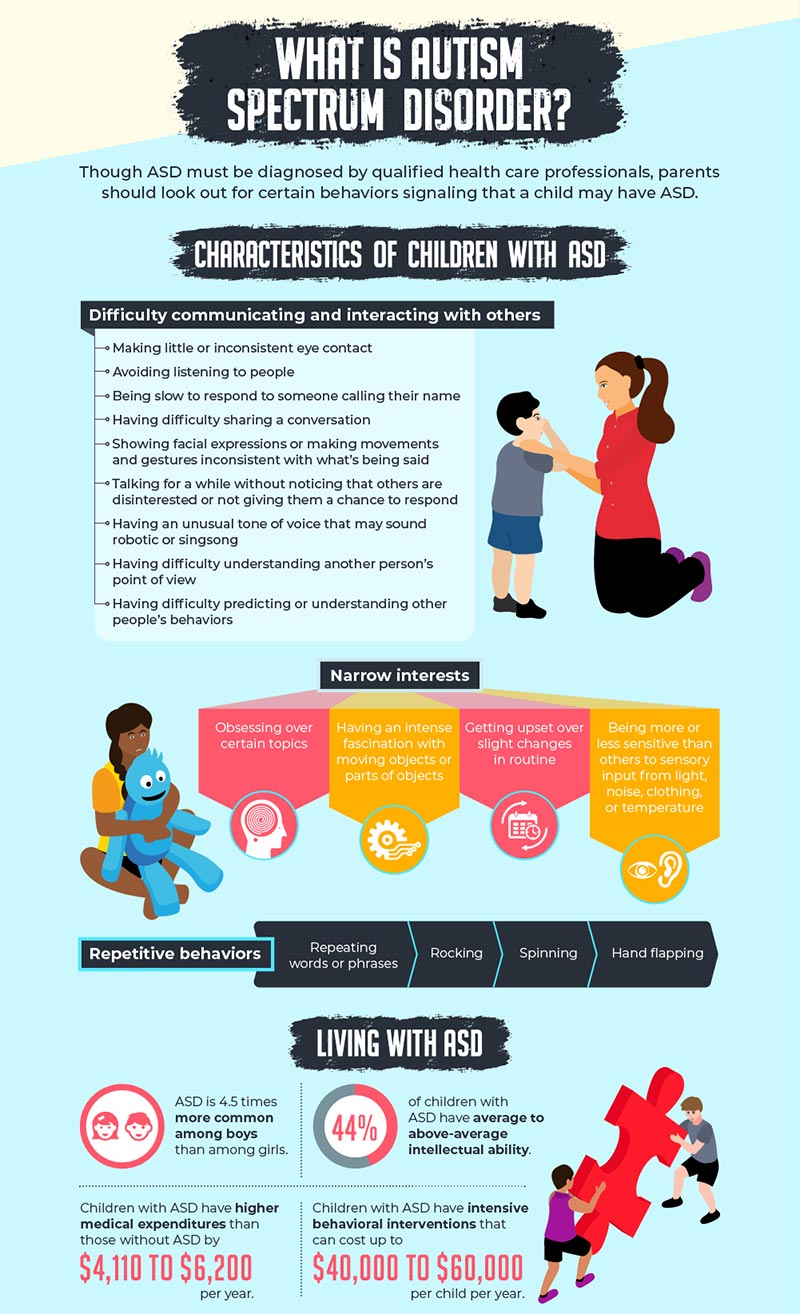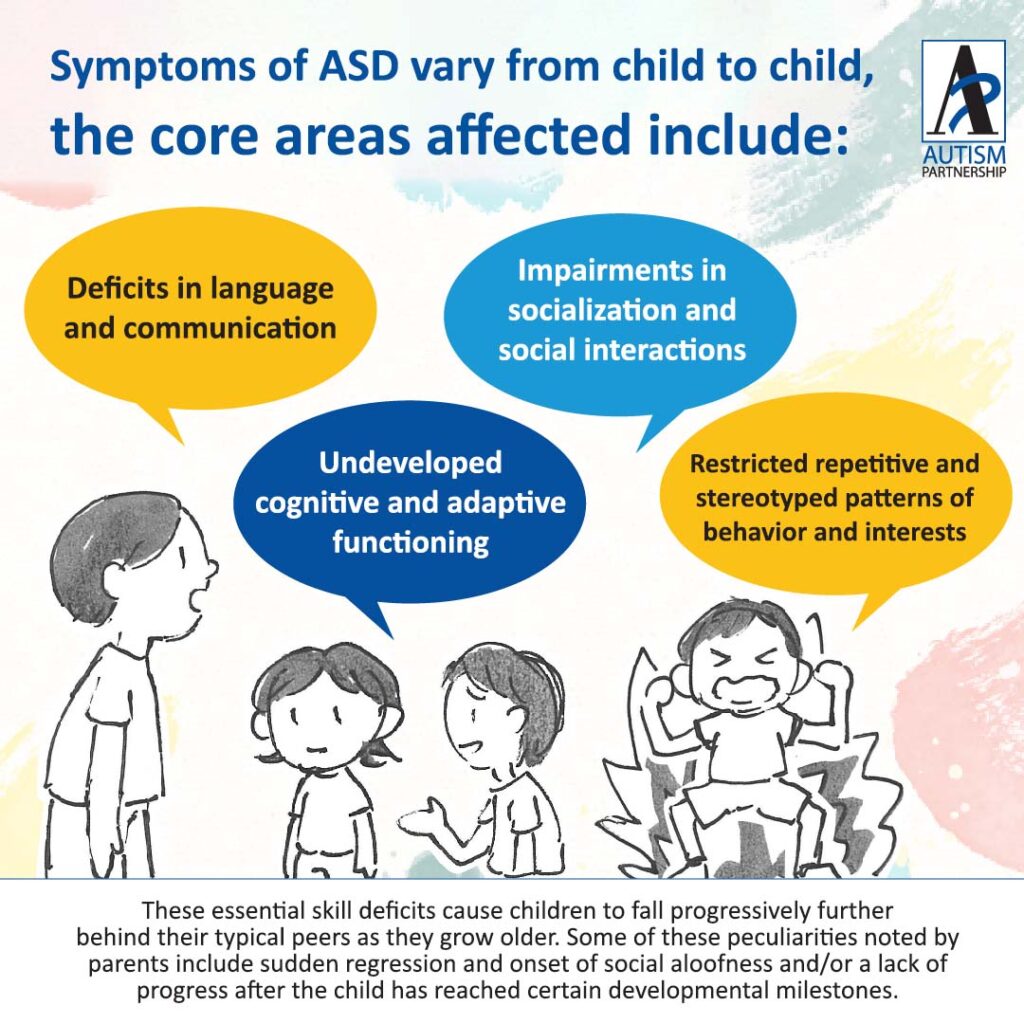Turning challenges into growth using Autism Behavioral Therapy
Turning challenges into growth using Autism Behavioral Therapy
Blog Article
Secret Indications and Signs to Acknowledge in Individuals With Behavioral Autism
When you encounter a person with behavioral autism, recognizing vital indications and symptoms is essential. In addition, sensory sensitivities can lead to overwhelming experiences.
Obstacles in Social Interactions
When you interact with somebody on the autism spectrum, you may notice they have problem with social hints and interaction. These difficulties can make social communications feel frustrating for them. You may see them staying clear of eye call or standing as well close or too much away during conversations, which can develop misunderstandings. They could not notice body movement or facial expressions, making it harder for them to determine how others are really feeling.
In addition, you may discover that they favor routines and acquainted setups, which can limit their determination to participate in new social circumstances. When they do involve, they might chat about their rate of interests in fantastic information without discovering if you're interested. This can result in one-sided conversations that leave you feeling detached. Understanding these challenges can assist you come close to communications with compassion and perseverance, fostering a more comfortable atmosphere for both of you.
Trouble With Verbal and Non-Verbal Interaction

Non-verbal interaction can be a lot more difficult. You might see an absence of eye contact or restricted usage of gestures, which can make communications feel unpleasant. Facial expressions might not constantly line up with the discussion, resulting in complication about their sensations. Recognizing these indications is crucial, as it assists you far better support and engage with people on the autism spectrum. By comprehending their interaction challenges, you can promote extra meaningful connections and give a more helpful setting.
Repetitive Habits and Routines
Interaction obstacles often accompany other indications of autism, such as recurring actions and a solid choice for regimens. You might notice that individuals with autism typically take part in certain, repetitive activities, like hand-flapping, shaking, or duplicating expressions. These habits can supply convenience and a feeling of control in an usually frustrating globe.
When they comply with a structured schedule,Routines are just as vital; several people prosper. You might discover that modifications to these routines can lead to significant distress. If they have an everyday ritual of consuming morning meal at a certain time or complying with a particular path to school, any type of disruption can trigger anxiety.
Recognizing these patterns helps you recognize their habits and offer assistance. By fitting their need for regular and enabling repetitive activities, you can produce a more comfy environment that reduces their obstacles.
Sensory Sensitivities

Typical Sensory Triggers
Sensory level of sensitivities can considerably affect every day life for individuals with autism, as particular stimulations typically cause overwhelming responses. Usual sensory triggers include loud noises, brilliant lights, and solid scents. You might observe that abrupt sounds, like alarms or alarms, trigger stress and anxiety or distress. Fluorescent illumination in stores can really feel rough and uncomfortable. Appearances can additionally play a significant role; rough materials or specific food appearances might be excruciating for you. Additionally, crowded places can overwhelm your senses, making it hard to focus or unwind. Comprehending these triggers can assist you handle your atmosphere much better. By knowing what impacts you, you can take actions to lessen pain and enhance your everyday experiences.
Behavior Feedbacks Clarified
Recognizing your behavioral actions to sensory level of sensitivities is necessary, as they frequently disclose how you communicate with the globe. You may likewise locate yourself seeking certain sensory experiences, like deep stress or quiet atmospheres, to aid ground yourself. Acknowledging these patterns aids you understand your needs much better and can lead how you interact them to others.
Coping Methods Review
Recognizing your sensory sensitivities is just the first action; currently it's time to explore coping methods that can help you take care of those experiences effectively. Start by producing a sensory toolkit customized to your requirements. Developing a structured published here routine can likewise offer predictability, lowering anxiousness around sensory overload.
Restricted Rate Of Interests and Focus
While numerous people establish a broad array of rate of interests, those with autism often demonstrate restricted rate of interests and an intense concentrate on details subjects. You may see that someone with autism can invest hours diving into their preferred topic, whether it's a specific kind of train, a details film, or a scientific principle. This intense emphasis isn't just a hobby; it can end up being a central component of their identity and social interactions.
You may locate that discussions revolve around these rate of interests, and they might struggle to engage in wider topics. By comprehending and acknowledging these limited passions, you can foster a helpful atmosphere where they really feel valued and recognized, allowing for more significant connections and interactions.
Psychological Law Difficulties
Individuals with autism frequently face challenges in psychological law, which can be affected by their intense focus on specific passions. You could observe that when an individual is deeply taken part in a recommended task, they can experience strong emotions, whether exhilaration or stress. When points don't go as planned., this strength often makes it hard for them to change gears or manage their sensations - Autism Behavioral Therapy.

Irregularity in Developmental Milestones
When it pertains to developing milestones, you'll discover that individuals with autism commonly reveal a large range of irregularity. Some might strike landmarks on time, while others might hang back or development at a different speed. You might see a child excel in language skills but struggle with social interactions. This inconsistency can be confusing, as conventional benchmarks don't always apply.
It's vital to recognize that each person's trip is special. Some may develop complex abilities early, just to deal with challenges later on. Others could take longer to accomplish fundamental milestones however then flourish in details locations. Observing these patterns can assist you understand their strengths and requires better.
Regularly Asked Concerns
How Is Autism Detected in Children and Grownups?
To identify autism in children and grownups, experts evaluate actions, communication abilities, and social interactions. They frequently make use of standardized examinations, interviews, and monitorings to figure out if an individual fulfills the requirements for autism range condition.
Exist Various Sorts Of Autism Range Disorders?
Yes, there are different types of autism range disorders, consisting of Asperger's disorder and pervasive developing disorder-not or else specified. Each kind differs in seriousness and features, so understanding these differences can aid you better assistance people with autism.
What Therapies Are Efficient for People With Autism?
When considering efficient treatments for people with autism, you'll find choices like Applied Actions Evaluation, speech therapy, and why not find out more work treatment. Each strategy can help enhance interaction, social abilities, and day-to-day functioning tailored to private demands.
Can People With Autism Lead Independent Lives?
Yes, individuals with autism can lead independent lives. With the best support, abilities training, and sources, you can help them create self-sufficiency, take care of everyday jobs, and prosper in different environments, promoting their self-reliance.
Just How Can Families Support Enjoyed Ones With Autism?
You can support your loved ones with autism by producing a structured atmosphere, motivating their passions, exercising perseverance, cultivating interaction, and promoting social skills. Celebrate their achievements, regardless of how small, and build a supportive community.
Although many individuals on the autism spectrum can make use of and recognize language, investigate this site they usually encounter substantial obstacles with both non-verbal and verbal communication. Recognizing these signs is essential, as it aids you far better assistance and engage with individuals on the autism range. You could observe that individuals with autism frequently engage in details, repetitive actions, like hand-flapping, rocking, or duplicating expressions.Sensory sensitivities can considerably influence day-to-day life for individuals with autism, as certain stimulations commonly activate overwhelming responses.When it comes to developmental milestones, you'll see that people with autism frequently reveal a large variety of irregularity.
Report this page